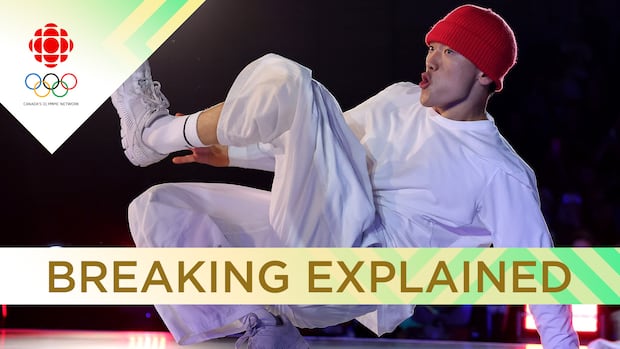Canada's Phil (Wizard) Kim captures Olympic gold medal in men's breaking
World No. 2 Vancouver native defeated Dany Dann of France to win title in Paris

Phil (Wizard) Kim was the first, and for the foreseeable future, the only Olympic champion in men's breaking.
The 27-year-old from Vancouver, known in his breaking circles as B-Boy Phil Wizard, captured gold at Place de la Concorde on Saturday.
The Canadian dominated his final battle with host-country favourite Danis Civil (Dany Dann) of France by winning all three rounds and taking 23 of a possible 27 votes from the judges.
The 2022 world champion and reigning Pan American Games champion Kim was a favourite in the performance sport making its Olympic debut in Paris.
It isn't on the menu in Los Angeles in 2028 nor is it certain to return in Brisbane, Australia, in 2032.
The sunny, charismatic Kim was that throughout his bouts Saturday, but he shed tears both on the podium during O Canada, in interviews afterward and when he embraced his mother Gilsoo, father Byung Tae and brothers Daniel and John.
"I was stressed out of my mind," Kim said. "Yesterday, I cried my eyes out because I was so scared to do this.
"There's been a lot of pressure and a lot of expectations. I'm glad I was able to deliver. More than anything I'm glad I just enjoyed the moment. I truly had a lot of fun today.
"This is history in the making for us, so it's incredible."
The Olympic Games brought from its urban hip-hop roots to a broader international sport stage a sport that pushes the limits of human body movement performed to a beat.
"I hope it opens doors for people," Kim said. "I've dedicated my life to this and so have all of us competing today, and it's an underappreciated sport."

The breakers were not forewarned of the beat provided by DJ's Phlash One and Fleg, but expressed the music when they heard it through footwork, freezes, transitions, power moves, tricks and flips.
The men's creative instincts worked as hard as their bodies Saturday to avoid repetition and impress the judges at the packed temporary venue that also served as the site of three-on-three basketball in Paris.
Kim dropped just one round in the group stage in which battles are two rounds, but defeated Ukraine's Oleh Kuznetsov (Kuzya) 10-8 in overall votes en route to topping his group undefeated.
Kim knocked Shigeyuki Nakarai (Shigekix) to the bronze-medal bout with a 3-0 (17-10) victory in the semifinal.
Reigning world champ Victor Montalvo of the United States, who is known simply as Victor, defeated the Japanese for bronze.
"It was next level. Everyone was on their A-game," Montalvo said. "It was very difficult, maybe the most difficult of my career, but it was fun."
After sweeping Civil 2-0 in his bout of the day, Kim unleashed a dizzying array of sequences in the gold-medal battle to best the Frenchman again.
"I was lucky, because I battled Danny Dan early on in the round-robin, and so I knew what to expect going into it," Kim said.
WATCH | Explaining the rules of Olympic breaking:
Breakers are judged on technique, vocabulary — which is variety of moves, styles, and transitions — execution, musicality and originality with each counting for 20 per cent of the score.
"It's my spontaneity," Kim explained. "I go up there with truly nothing in my head. I just go up there and whatever the music dictates me to do, I do.
"Because of that, I can create some magic moments."
Nine judges, who also go by single names, warmed up the crowd with their own breaking session as they were introduced.
MCs Malik and Max had to urge spectators to stop booing the elimination of acrobatic Hiroto Ono (Hiro10) of Japan from the group stage.
"To the naked eye, it's very easy to think that the person who's spinning the most, that is doing the craziest moves is going to win," Kim explained.
"All my respect to Hiro. He's an incredible person, an incredible kid. I have so much love for him, but there's a lot of details within the dance.
"For us, it's all about style and originality. I hope people continue to watch breaking and start to understand."
World's 1st introduction to Olympic breaking
Friday was the world's first introduction to Olympic breaking, with 17 b-girls taking the Olympic stage for the first time in its history. The b-girls battled fiercely in their own right, but several moments caused some viewers to raise questions about whether the essence of the hip-hop art form was captured at the Paris Games.
Friday night's slips, as well as what Zack Slusser, vice president of Breaking for Gold USA and USA Dance, said was a failure by organizers to fully explain the rules and basics of the new Olympic event to the audience "led to what I would call immediate media evisceration of breaking."
"But I do think and I'm hoping desperately that, today, the same number of people tuned in to watch and we have redeemed ourselves."
With files from The Associated Press and CBC Sports


